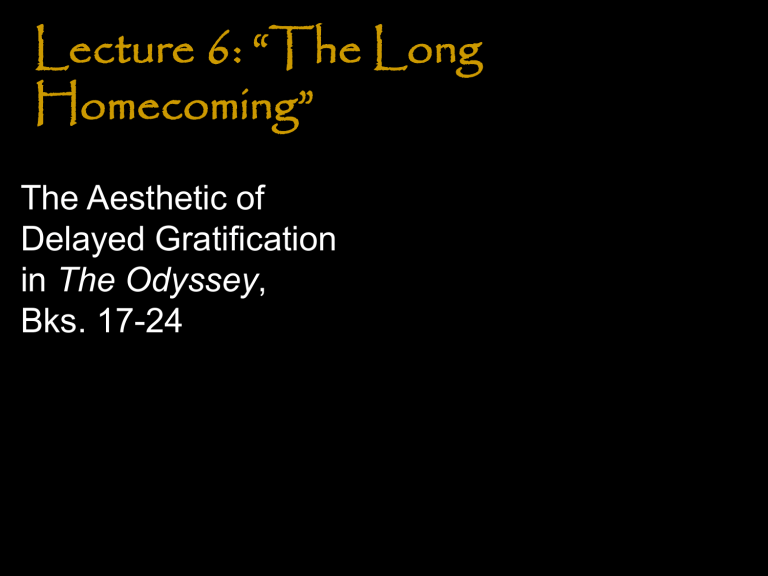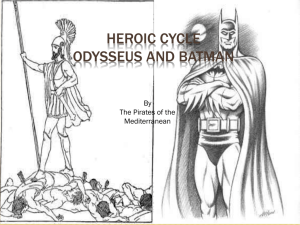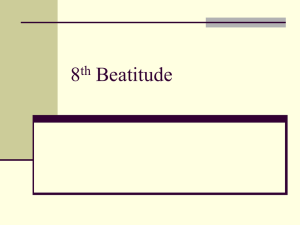Unit1lecture6 - IU School of Liberal Arts @ IUPUI

Lecture 6: “The Long
Homecoming”
The Aesthetic of
Delayed Gratification in The Odyssey ,
Bks. 17-24
“Homecoming”: How Character and
Dramatic Structure Require Delay
• An ancient critic has said “Homer nods”
• In fact, Homer “builds”
• Two Reasons for delayed gratification in Bks.
17-24
– Character of the Protagonist
– Dramatic/structural needs of the epic
“Homecoming”:
Character requires delay
• Odysseus must not only win back his home; he must win back his identity
• He has become his disguise; he is defined by distrust;
“Odysseus’s isolation has gone even further because distrust has now become systematic in him, and has displaced nearly all other visible traits of personality and expressions of feeling… Distrust has become its own justification, as though it were an art form. (Douglas Stewart:
“The Disguised Guest” 190-191)
• Some examples
– His distrust of the Phaiakians when they leave him in Ithaca (xiii.221-
243 [Nor. 8 th ])
– His reaction to Eurykleia recognizing his scar (xix.539-554 [8 th ])
– His distrust of Athena (xx.39-59 [8 th ])
• Slow distrustful recovery of his identity means he must engage in timeconsuming process of “testing”
“Homecoming”:
Dramatic Structure
Requires Delay
• Delay as aesthetic “foreplay” which makes for intensely satisfying resolution
– 1) Humiliation of Odysseus must be made complete
– 2) The worth (or worthlessness) of characters must be fully revealed so that......
– 3)The suitors “judgment’ day will provide a complex and complete satisfaction
– 4)The reunion with Penelope will be wholly fulfilling
“Homecoming,”
“Structure” (1):
“Hero’s Complete Humiliation”
• First encounter with Melanthios as pattern of subsequent humiliations
– A pitiable figure in the eyes of a servant (xvii.214-221 [Nor.
8 th ])
– A subject of mockery and blows by the “worthless” (231-244
[8 th ]))
– Exercising of almost unbearable self-control (257-60[8 th ])
– Finds a defender and retribution is foreshadowed.
– Retribution laughed at (271-9 [8 th ])
• Pattern repeats throughout the rest of the epic
– “Stool-throwing” episode” (xvii.370-544 [8 th ])
– “Double-Dose” of Mockery from the maids and suitors
(XVIII. 350-462 [8 th ])
– Another missile from the suitors (xx 320-355 [8 th ])
– Maddening impudence from faithless maids (XX 1-28 [8 th ])
“Homecoming,” Structure,” (1)
“Hero’s Humiliation” (Concluded)
•
Not only repeats, but intensifies
The rage in his breast reined back —unswerving. . .
all endurance. But he himself kept tossing, turning, intent as a cook before some white-hot blazing fire who rolls his sizzling sausage back and forth packed with fat and blood
—keen to broil it quickly
Tossing, turning it, this way, that way —so he cast about:
How could he get those shameless suitors in his clutches.
(xx.26-33 [Nor. 8 th ])
• Thus fulfills Athena’s plan to make his humiliation complete
– After, an earlier “double dose” of mockery from maids and suitors Homer says
But Athena had no mind to let the brazen suitors
Hold back now from their heartrending insults.’
She meant to make the anguish cut still deeper
Into the heart of Laertes’ son Odysseus. (xviii.391-394 [8 th ])
– Later, just before the contest of the bow
But Athena
But Athena had no mind to let the brazen suitors
Hold back now from their heartrending insults.’
She meant to make the anguish cut still deeper
Into the heart of Laertes’ son Odysseus(xx.316-19 [8 th ])
• Why? Perhaps human drama as theater for the gods
–
Human drama as a kind of theater for the gods
– And the audience!
“Homecoming,” Structure,” (2)
“Revelation of Character Worth”
• The extended humiliation reveals who has passed and failed the “absence” test
– Does he over do it with Penelope?
– Though Penelope’s tricks make his heart laugh (xviii.18), he keeps on testing (xix.45-49)
– The emotional toll of Odysseus’s testing
He gave his falsehoods all the ring of truth.
As she listened on, her tears flowed and soaked her cheeks
As the heavy snow melts down from the high mountain ridges,
Snow the West Wind piles there and the warm East Wind thaws
And the snow, melting, swells the rivers to overflow their banks —
So she dissolved in tears, streaming down her lovely cheeks:
Weeping for him, her husband, sitting there beside her.
Odysseus’ heart went out to his grief-stricken wife
But under his lids his eyes remained stock still —
They might have been made of horn or iron —
His guile fought back his tears (xix.235-45 [8 th ])
– Significant words and phrases
• “lies….truthful”
• “wept if he willed, inwardly”
• The effect of the simile
“Homecoming,” Structure,” (2)
“Revelation of Worth” (Cont)
• The humiliation of Odysseus reveals the worth of the humble
– Eumaios
– Argos
– Eurykleia
– Philoitios, the cowherd
(3) “Suitors’ Judgment” as Complex Satisfaction
• Homer fills “two cups”: pathos and revenge
• Pathos
– Elements of tragic necessity as well as deserved retribution
– Amphinomos as paradigm of “good” but doomed suitor
• His worthy actions (xvi.431-448; xviii.130-38)
• Odysseus’s sympathetic warning:
“Of all that breathes and crawls across the earth,
Our mother earth breeds nothing feebler than a man (xviii.150-151
[Nor. 8 th ])
And so I say, let no man. . . be lawless
Just take in peace what gifts the gods may give (162-3 [Nor. 8 th ])
“I say he’s right at hand—and may some power
Spirit you home before you meet him face to face (167-8 [8 th ])
• His fatal rejection
– “by Athena bound”: the aesthetic necessity of his death
“Homecoming,” Structure,” (3)
“Complex Satisfaction” Cont.
• Revenge
• Antinoos as paradigm of “evil” suitor:
– A list of his sins
– A typical incident
• The bow contest as an aesthetic set up for
“sweet revenge”
– The suitors’ sneers
– Antinoos lifted cup
• Merciless judgment
“Homecoming,” Structure,” (3)
“Complex Satisfaction” (concluded)
•
A pathos-filled aftermath
– Judgment (Leodes), mercy, (Phemios) humor (Medon)
– Death described in two “pathetic” similes
• Suitors:
Think of a catch that fishermen haul in to a halfmoon bay in a fine-meshed net from the white-caps of the sea: how all are poured out on the sand, in throes for the slat sea, twitching their cold lives away in Helios’ fiery air: so lay the suitors heaped on one another. (xxii.402-407) (Norton 8 th ed.
Version is p. 471, lines 408-413)
• Serving women:
They would be hung like doves or larks in springe’s triggered in a thicket, where the birds think to rest
—a cruel nesting.
So now in turn each woman thrust her head into a noose and swung, yanked high in air, to perish there most piteously
Their feet danced for a little, but not long ( Norton 8 th on p. 473-494-499) ed. Version of this is
• What is the “tone” of above similes? Is it variance with “tone” of preceding action?
Why does Homer use these particular similes?
“Homecoming,” Structure,” (4)
Intensely Satisfying Reunion
•
The reunion scene resolves three building tensions:
– Increasingly desperate delaying tactics now pay off
– Building emotional tension of “near but so far” is resolved
– Odysseus’s almost absurd distrust is “paid back” as Penelope tests him.
• Climax
. . . as the sunwarmed earth is longed for by a spent swimmer
Spent in rough water where his ship went down
Under Poseidon’s blows, gale winds and tons of sea.
Few men can keep alive through a big surf
To crawl, clotted with brine on kindly beaches
In joy, in joy, knowing the abyss behind:
And so she too rejoiced, her gaze upon her husband,
Her white arms round him pressed as though forever. . . .
So they came
Into that old bed so steadfast, loved of old,
Opening glad arms to one another. (xxiii.237-44; 298-300) (Norton 8 th version is p. 479, lines 259-272; p. 481, lines 335-338) edition







